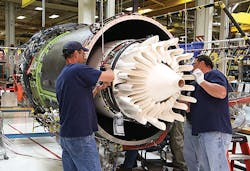GE Aviation Building Two Plants to Produce Ceramic-Matrix Materials
GE Aviation committed to invest over $200 million to build two plants in Huntsville, Ala., where it will mass-produce silicon carbide (SiC) and ceramic matrix composite (CMC) materials, both of which are essential for manufacturing components for jet engines and land-based gas turbines.
CMCs are an increasingly important aspect of aerospace design, in particular for engine parts, as they provide lightness and heat-resistance needed for high-performance systems. The LEAP turbofan engine being developed by GE Aviation’s joint-venture CFM International — and selected for installation in the forthcoming Airbus A32neo and Boing 737 MAX jets — is the first commercial jet engine to use CMCs, as shrouds in the high-pressure turbine section.
Earlier this year, GE Aviation demonstrated the world’s first successful application of CMC engine blades in a demonstrator F414 engine for combat aircraft.
The manufacturer also noted that demand for CMCs is forecast to grow dramatically in the next ten years, in particular because of the need established by the jet engine applications. Each LEAP, for example, requires 18 CMC turbine shrouds, which direct air and ensure turbine blade efficiency. CMCs also are used in the combustor and high-pressure turbine section of the new GE9X engine.
“Establishing the new GE factories in Alabama is a very significant step in developing the supply chain we need in order to produce CMC components in large volume,” stated Sanjay Correa, vice president of the CMC Program at GE Aviation.
CMCs are a complex of SiC ceramic fibers embedded in a SiC matrix, then coated in proprietary materials. The result is a material that is one-third as dense as comparably deployed metal alloys, thus highly effective at reducing the weight of turbofan engines.
Also, because CMCs are more heat resistant than metal alloys so they require less cooling air in an engine’s hot section. Using the air in the engine flow path instead means that an engine can run more efficiently — generating less heat, which reduces engine maintenance, and reducing fuel consumption.
One of the new plants will produce SiC ceramic fiber, reportedly the first such operation in the United States. An adjacent operation will use the SiC ceramic fiber to produce the unidirectional CMC tape needed to fabricate CMC components.
The SiC ceramic fiber plant will be developed with $21.9 million of support funding from the U.S. Air Force Research Lab Title III Office. The fiber-production technology will be licensed from NGS Advanced Fibers Co. in Japan, a joint-venture of Nippon Carbon (50% ownership), GE (25%), and Herakles Safran France (25%.) GE emphasized the new plant would “dramatically increase U.S. capability to produce SiC ceramic fiber capable of withstanding temperatures of 2400°F,” and it will sell fiber to the U.S. Department of Defense, GE businesses, Safran, and other customers subject to U.S. regulations.
The second plant will be financed solely by GE, and apply GE proprietary coatings to the ceramic fiber, then form the material into a matrix to produce CMC tape. The ceramic tape will be used by GE Aviation at its CMC manufacturing site in Asheville, N.C. That plant fabricates CMC shrouds for the LEAP engine’s high-pressure turbine section.
Construction of the two Alabama plants will begin in mid-2016, and completion is expected in the first half of 2018. Manufacturing will begin in 2018.
About the Author
Robert Brooks
Content Director
Robert Brooks has been a business-to-business reporter, writer, editor, and columnist for more than 20 years, specializing in the primary metal and basic manufacturing industries.
